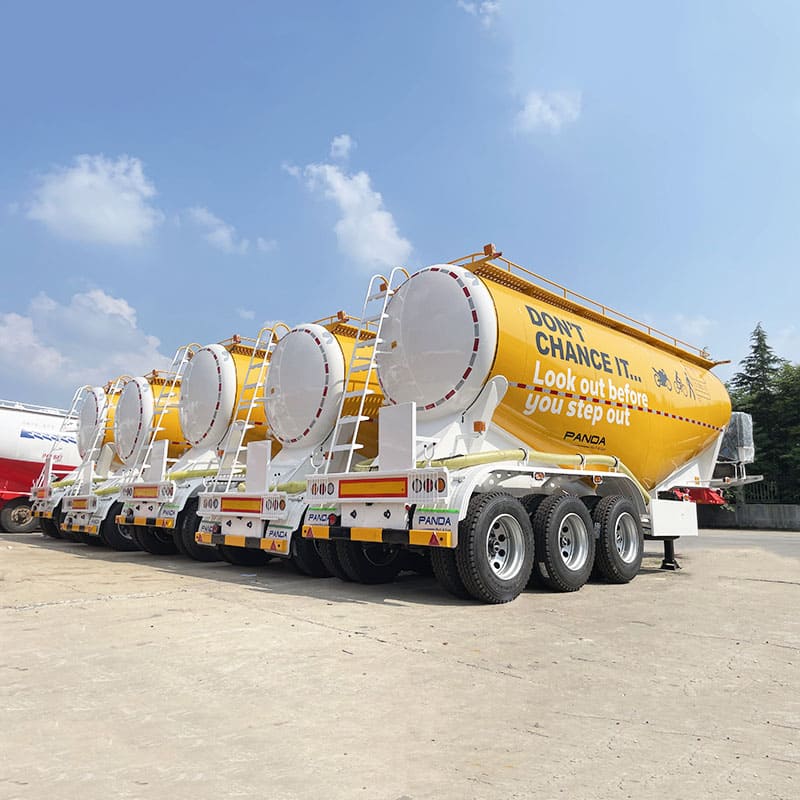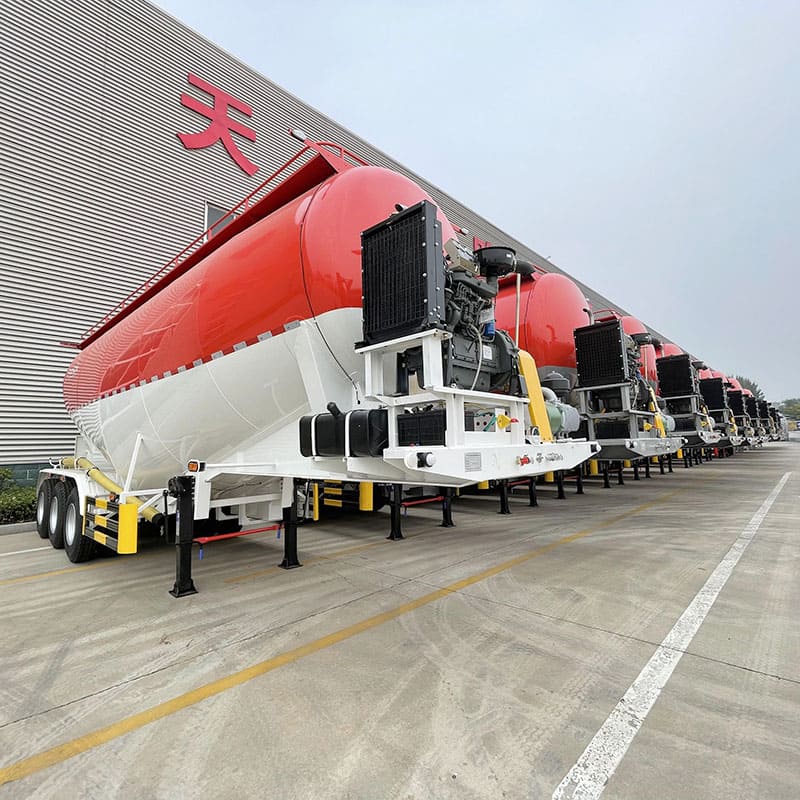The Cement bulker trailer, aptly named for its role in transporting bulk powder cargo, is a staple in industries such as construction and food production. This cement bulker trailer is typically used to carry substances like cement, flour, lime powder, mineral powder, fly ash, chemical powders, and stone powder.
You’ll often find these cement bulker trailers hard at work in busy construction zones and bustling cement factories or warehouses. These bulk cement trailers employ a compressed air system for unloading the powder, enhancing their efficiency.

Benefits of cement bulker
These cement bulker, recognized for their vacuum-sealed and enclosed design, are specially constructed for transporting cement and other powders. Here’s why they stand out:
- Ease of Use: Their installed pneumatic system simplifies offloading, making them a time-efficient choice for frequent transportation tasks.
- Quality Preservation: The vacuum-sealed tank keeps the cargo isolated from external air, maintaining the product’s quality and usability. The tank design also ensures no mold, germs, or moisture can infiltrate and contaminate the contents.
- Trasnport: A large amount of bulk cement can be transported at a time, and the maximum transportation can be up to 120ton. (Related: how to transport cement safely)
- Efficiency: Whether loading or unloading, the speed is very fast, which improves the efficiency, saves the cost and increases the profit.
- Compressed Air Safety: Compressed air within the pneumatic system moves the cargo via pipes and compartments. Accurate mechanical understanding and proper operation procedures are essential to ensure smooth unloading.
- Safe Operation: Modern pneumatic tankers now operate at ground level, significantly reducing fall risks. If a driver needs to climb onto the tanker, secure handrails and ladders are provided to minimize injury risks.
In sum, these specialized trailers offer practical advantages over conventional trailer types used for powder transportation, making them a valuable asset for various industries.


Different type of cement bulker
Bulker trucks, crucial for transporting powder cargo, are structured in three distinct ways: horizontal, funnel, and lifting. Each structure caters to a specific type and weight of cargo.
It’s crucial to understand the benefits and drawbacks of each structure to make an informed decision. Cement bulker trailers, in particular, require several safety measures due to inherent safety concerns that need skilled and competent drivers to manage.
Now, let’s discuss different cement bulker trailers based on orientation and structure. These are a few of many options available to you:
- Horizontal Type: These cement bulkers are known for their stability due to a low center of gravity and large volume. They are quick to build up the necessary gas pressure and also speed up the discharge process. Their downside is that they use pneumatic discharge, leaving some residual powder, limiting their use to materials like cement and fly ash.
- Funnel Type: These cement bulkers are more versatile, able to transport both powder/granule material and massive materials. Powder and granule materials use pneumatic discharge while massive materials rely on gravity tipping. Due to the cement bulker tank’s design, residual rates are low, and pollution is minimized. These cement bulker tanks are a prime choice for transporting food materials and powder chemical material.
- Lifting Type: Ideal for offloading in tight spaces, these lifting cement bulkers are durable with ample storage. They can transport a variety of materials and utilize both pneumatic discharge and gravity tipping. With minimal residuals, a simple internal structure for easy cleaning, and multipurpose use, these tanks provide high versatility.
Safety is paramount with these cement bulkers. Compressed air in the pneumatic system moves cargo through pipes and compartments, requiring a comprehensive understanding of mechanical operations for smooth offloading. Regular maintenance ensures good condition, mitigating risks related to the cement tank trailer and cargo. Modern cement tankers can be operated at ground level, reducing fall risks, and are equipped with handrails and ladders for secure access if necessary.

Therefore, the terrain, payload weight, and type of material you’re transporting will guide your choice of cement bulker. Regardless of your choice, these dry bulk trailers offer efficient, secure, and versatile solutions for transporting various materials.
Type of fluid bed
Cement bulker trailers, essential for bulk powder transportation, are carefully engineered with primarily aluminum or steel to provide capacities ranging from 30-120 ton, 25-100 cbm. A critical component of these bulk cement trailers is the fluid bed, which comes in different structures: X type, funnel type, and pipe type.
- X Type: This fluid bed has an X shape at the bottom. The angle between the sliding plate and the horizontal plane ranges from 42° to 45°. While it’s longer than other types, its discharging effectiveness is low, leaving a significant amount of residual materials after discharge. Its operation is also complex due to its large porous plate.
- Funnel Type: Named for its funnel-shaped internal sliding plate, this fluid bed also has a 45° angle between the sliding plate and the horizontal plane. It’s short and has multiple compartments, enabling it to transport different types of powder simultaneously. However, its unloading speed is slower, particularly for materials with a large rest angle, and its complex structure makes production less efficient.
- Pipe Type: This fluid bed is directly attached to the tank’s bottom. It has a similar angle to the X type and can be up to 6 meters long, resulting in fewer compartments. Its simple structure allows easy and cost-effective manufacturing and maintenance, but its long flow distance means it’s only suitable for transporting materials with a small rest angle, like cement and fly ash.
Therefore, selecting a cement bulker trailer involves considering its structure, efficiency, and applicability. Whether buying new, used, or renting, ensure your choice fits your needs. This guide aids in choosing a cement bulker trailer that ensures easy offloading, even in tight spaces, while offering maximum efficiency, cost-effectiveness, and safety in cargo transportation. If in doubt, seek professional guidance to save money and work efficiently while ensuring safe operations.


